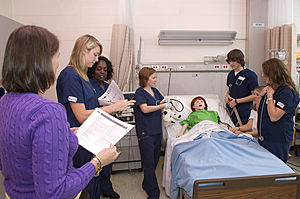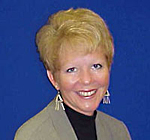

ADVERTISEMENT
- Rozovsky wins prestigious NSF Early Career Award
- UD students meet alumni, experience 'closing bell' at NYSE
- Newark Police seek assistance in identifying suspects in robbery
- Rivlin says bipartisan budget action, stronger budget rules key to reversing debt
- Stink bugs shouldn't pose problem until late summer
- Gao to honor Placido Domingo in Washington performance
- Adopt-A-Highway project keeps Lewes road clean
- WVUD's Radiothon fundraiser runs April 1-10
- W.D. Snodgrass Symposium to honor Pulitzer winner
- New guide helps cancer patients manage symptoms
- UD in the News, March 25, 2011
- For the Record, March 25, 2011
- Public opinion expert discusses world views of U.S. in Global Agenda series
- Congressional delegation, dean laud Center for Community Research and Service program
- Center for Political Communication sets symposium on politics, entertainment
- Students work to raise funds, awareness of domestic violence
- Equestrian team wins regional championship in Western riding
- Markell, Harker stress importance of agriculture to Delaware's economy
- Carol A. Ammon MBA Case Competition winners announced
- Prof presents blood-clotting studies at Gordon Research Conference
- Sexual Assault Awareness Month events, programs announced
- Stay connected with Sea Grant, CEOE e-newsletter
- A message to UD regarding the tragedy in Japan
- More News >>
- March 31-May 14: REP stages Neil Simon's 'The Good Doctor'
- April 2: Newark plans annual 'wine and dine'
- April 5: Expert perspective on U.S. health care
- April 5: Comedian Ace Guillen to visit Scrounge
- April 6, May 4: School of Nursing sponsors research lecture series
- April 6-May 4: Confucius Institute presents Chinese Film Series on Wednesdays
- April 6: IPCC's Pachauri to discuss sustainable development in DENIN Dialogue Series
- April 7: 'WVUDstock' radiothon concert announced
- April 8: English Language Institute presents 'Arts in Translation'
- April 9: Green and Healthy Living Expo planned at The Bob
- April 9: Center for Political Communication to host Onion editor
- April 10: Alumni Easter Egg-stravaganza planned
- April 11: CDS session to focus on visual assistive technologies
- April 12: T.J. Stiles to speak at UDLA annual dinner
- April 15, 16: Annual UD push lawnmower tune-up scheduled
- April 15, 16: Master Players series presents iMusic 4, China Magpie
- April 15, 16: Delaware Symphony, UD chorus to perform Mahler work
- April 18: Former NFL Coach Bill Cowher featured in UD Speaks
- April 21-24: Sesame Street Live brings Elmo and friends to The Bob
- April 30: Save the date for Ag Day 2011 at UD
- April 30: Symposium to consider 'Frontiers at the Chemistry-Biology Interface'
- April 30-May 1: Relay for Life set at Delaware Field House
- May 4: Delaware Membrane Protein Symposium announced
- May 5: Northwestern University's Leon Keer to deliver Kerr lecture
- May 7: Women's volleyball team to host second annual Spring Fling
- Through May 3: SPPA announces speakers for 10th annual lecture series
- Through May 4: Global Agenda sees U.S. through others' eyes; World Bank president to speak
- Through May 4: 'Research on Race, Ethnicity, Culture' topic of series
- Through May 9: Black American Studies announces lecture series
- Through May 11: 'Challenges in Jewish Culture' lecture series announced
- Through May 11: Area Studies research featured in speaker series
- Through June 5: 'Andy Warhol: Behind the Camera' on view in Old College Gallery
- Through July 15: 'Bodyscapes' on view at Mechanical Hall Gallery
- More What's Happening >>
- UD calendar >>
- Middle States evaluation team on campus April 5
- Phipps named HR Liaison of the Quarter
- Senior wins iPad for participating in assessment study
- April 19: Procurement Services schedules information sessions
- UD Bookstore announces spring break hours
- HealthyU Wellness Program encourages employees to 'Step into Spring'
- April 8-29: Faculty roundtable series considers student engagement
- GRE is changing; learn more at April 15 info session
- April 30: UD Evening with Blue Rocks set for employees
- Morris Library to be open 24/7 during final exams
- More Campus FYI >>
2:29 p.m., Oct. 20, 2009----The University of Delaware's undergraduate nursing curriculum, which concentrates students' clinical experiences into an intensive senior year, has been recognized by the National League for Nursing as one of the most innovative in the nation.
The league, a professional association that represents 1,200 institutions and 28,000 individuals, selected UD's School of Nursing among 15 undergraduate programs across the country to highlight at its annual meeting in September. The programs were chosen because they offer innovative, creative and effective methods of educating future nurses, according to the organization.
The University's undergraduate nursing curriculum was revamped in 2005 to delay much of the students' direct care of patients until their final year of school. Previously, nursing students gained clinical experience off-campus throughout their four years as undergraduates. Now, they still go into hospitals and other healthcare settings throughout those years, but the first three are more focused on observing nursing care and interacting with patients in other capacities, said Judy Herrman, associate professor of nursing and coordinator of undergraduate clinical experiences.
“Since the 1850s, we've been educating nurses through on-the-job training, a sort of baptism by fire,” Herrman said. “But now, the patients are too sick, the cases too complex, and they're too surrounded by technology to have students learning on the job. Our curriculum ensures that our students first have the knowledge, that they have all the skills under their belts, and then they're allowed the privilege of actually caring for patients.”
Another advantage of the intensive senior year clinical work is that students aren't distracted by academic courses, homework and tests while they're at work in a hospital, Herrman said. The immersion in hands-on work allows them to focus on honing their skills and prepares them for the transition they are about to make from student to working professional, she said.
Other benefits of the new curriculum are in patient safety and the efficient use of faculty time, Herrman said. For example, she said, a faculty member can teach a larger group of sophomores than was possible when that class also required clinical supervision of the students. That, in turn, has allowed the School of Nursing to shift some of its faculty time to senior students, who need that close supervision during their clinical experiences.
The curriculum change has been made possible by the school's high-tech simulation lab, in which lifelike, programmable mannequins are used to give students practice in everything from checking a medical chart and helping a patient get out of bed to caring for a premature baby and responding to a heart attack or other emergency.
“Students are in the simulation lab from freshman year on, and it gives them great experience -- the kind of experience they really remember because it's so realistic,” Herrman said. “When we decided to change the curriculum, we were very careful to create lots of experiences for students during their first three years that would prepare them well for the clinical immersion. When they begin their senior year, they really are knowledgeable and more confident than in the past.”
In addition to the simulation lab, students' first three years include field experiences in every course; they observe surgery and labor and delivery, for example, and they might engage in such activities as taking a hospital patient's health history. They also are required to work at least 160 hours, often during Winter Session or summer, in a healthcare setting, usually in a job such as patient care assistant.
Herrman said students have been successful in the curriculum, which is continuing to be evaluated, and reports from working nurses indicate that they are finding the UD seniors very well prepared. She has been asked to speak around the country about the curriculum as other schools consider changing their approaches to educating nurses.
The School of Nursing at UD graduates about 125 students each year in its traditional bachelor of science in nursing program. In addition, it offers programs for registered nurses without a bachelor's degree to earn that degree and for individuals with bachelor's degrees in other fields to earn an accelerated, second degree in nursing.
Article by Ann Manser


